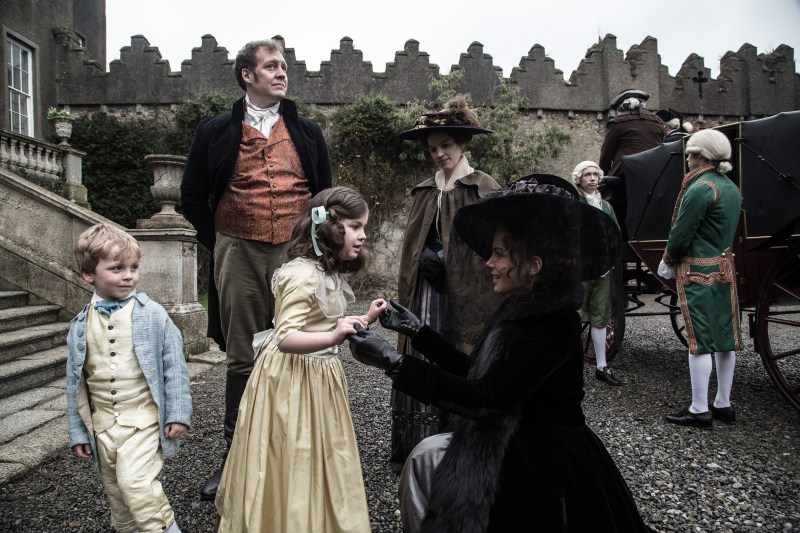It was only a matter of time before Whit Stillman did a Jane Austen movie. His films (“Metropolitan,” “Last Days of Disco,” “Damsels in Distress”) feel like Austen stories already: upper-class losers, licked by the system, desperately paddling to remain afloat in treacherous waters (Austen’s uppity England, Stillman’s Reagan-era America) while maintaining crisp, self-deprecating candor. Now, Stillman (in a neat summation of his career to this point) releases “Love & Friendship,” elaborating on an unfinished and little-known Jane Austen novella “Lady Susan” with more-than-stellar results. Don’t be tempted to think this is just some flight of comedic fancy. Its very existence is a call to arms for smarter, snappier movies, which refuse to forget cinema’s history as an entertaining art form.
Kate Beckinsale plays Lady Susan, a widow who suddenly decides to move in to her late husband’s estate in his hometown Churchill. This devilishly quick-on-her-feet elite treats her late husband’s family and friends less like lords and ladies and more like serfs and slaves. (“She looks rah-ther like a calf,” she drones at one point, her voice half-caught between bemusement and contempt.) Lady Susan is a cold, narcissistic opportunist; she thinks she’s superior to the plebes surrounding her, and she trusts absolutely nobody. Naturally, then, her best friend is an American (Chlöe Sevigny). They both spend their days gaming the English high-society system, trying to find a good suitor for Lady Susan’s daughter Frederica — and, more importantly, a new well-to-do husband for Lady Susan herself.
“Love & Friendship” is by far the most literate movie that you’ll catch in theaters. Modifying his typical formula only slightly from “Barcelona” and “Metropolitan,” Stillman serves up delightful repartee among the most passive-aggressive bunch of brats we’ve encountered in a while. Yet these characters are also in firm command of their words. There’s never a sense that they have self-doubt about who they are and what they stand for. They love being on top of the world and being rich, cantankerous bastards with no conception of the rigors of the working class. Thus, Stillman defiantly yet softly says, “Sod likability”, which perversely draws us closer in.
Lady Susan is a fascinating character in her own right. She isn’t your typical tragic female a la Flaubert’s Mme. Bovary. In fact, Lady Susan enjoys her devilish demeanor. As Kate Beckinsale said in The Daily’s interview with her, “I love playing characters like Lady Susan. She’s got a fantastic spirit, even if you don’t really want her in your life as a spirit.” There’s something liberating about seeing this kind of modern woman make mincemeat of her surroundings. She uses the system to her advantage and comes out on top. Beautiful.
But if the characters feel modern, Stillman’s films themselves seem like welcome, self-conscious anachronisms of some other time. Stillman is one of the few established directors on the American independent scene who still thinks in terms of scene, character, scenario — the raw material of pure moviemaking. The sadists making successful, independent brain-busters nowadays (i.e. the tedious Iñárritu-PTA-Nolan mind games) treat scenes and characters as impersonally as a high schooler scrambling the innards of a dead frog. In these directors’ hands, the character in any given scene is dissected, sloshed around and played around with — but never truly “engaged” with. Across the board, the idea of movies as a mass entertaining artform (entertainment and art balancing each other out) has diminished. The popular filmmakers today go in two directions: either they shrink scenes to bite-sized chunks, which treat us like morons (Michael Bay and Marvel), or stretch them like taffy into obscenely synthetic bloatfests of Meaning and Symbolism (Iñárritu and Paul Thomas Bland-erson).
Stillman rejects both roads. His is a laid-back style, prioritizing attention to the well-written line and the just-right gestures of actors’ faces. He has a tremendous knack for what an actor’s looks can bring to a movie.
A surprising element of his small but fascinating oeuvre: He slowly transitioned from using males to using females as his way into the world. This move has signaled an interesting change in his actors, who have become less definite and “type”-driven (nerdy Taylor Nichols, deadpan Chris Eigemen) and more mercurial and “mood”-driven (fetch Greta Gerwig, philosophical Chlöe Sevigny). The result is a whirling cinematic universe filled with loners, squares, hipsters, dumb clucks and opportunists — all bound by their absurd quests to “fit in” when they clearly just need to accept their quirky individuality and move on. This restlessness will certainly never escape Stillman, though; it keeps his films alive and rollicking.
His visual style is neither flashy nor calls attention to itself — all the better, to focus more keenly on his actors and riot-inducing scripts. He’s in the Hawks-Rossellini-Linklater family of plain Jane auteurs. They are all keenly aware that all you really need in a film is a camera to shoot with, a face to shoot at and a rhythm that’s very hushed. By keeping it low-key and dark (both in lighting and in humor), Stillman and company overcome a fashionable obsession with art for art’s sake. In the words of the Coen Brothers’ greatest creation (Jeff Bridges’s The Dude from “The Big Lebowski”), the Whit abides.
“I make films to be seen only once,” said Stillman in a recent interview with Slant Magazine. Indeed, everything I’ve highlighted needn’t inform your experience of watching “Love & Friendship.” Stillman has only one main goal: to serve up a spicy, entertaining evening soup for the adventurous moviegoer left hungry and comatose after a slew of superheroes and sequel slogs. In that respect, “Love & Friendship” succeeds. By being so different, by daring to presume its audience is open-minded enough to enjoy some Jane Austen shenanigans, Whit the Wit has already made a better movie than anything else coming out this year.
“Love & Friendship” opens in Palo Alto on Friday, May 20 at the CineArts Theater.
Contact Carlos Valladares at [email protected].
